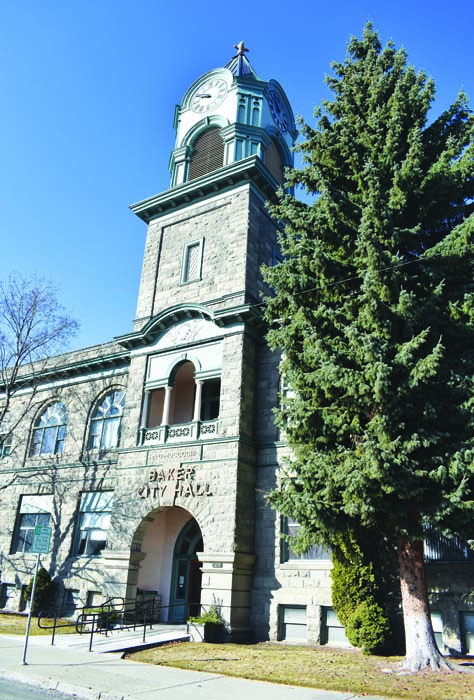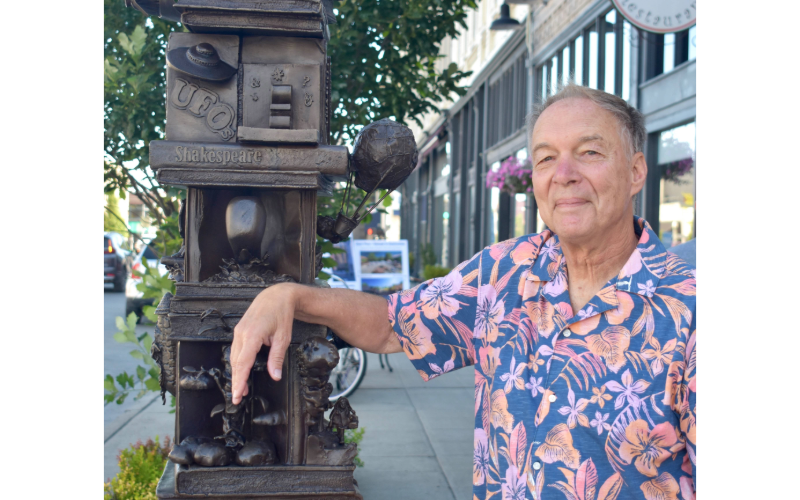Baker City Council to consider deal boosting fees paid by Oregon Trail Electric Cooperative
Published 9:08 am Monday, September 23, 2024

- Baker City Hall.
The Baker City Council will consider approving a new franchise fee agreement with Oregon Trail Electric Cooperative that would boost the city’s general fund revenue by about $160,000 per year.
Trending
Councilors will consider the proposed 10-year agreement during their regular meeting Tuesday, Sept. 24, at 6 p.m. at City Hall, 1655 First St.
Franchise fees are one of the larger revenue sources in the general fund, which includes the police and fire departments. A projected shortfall in general fund revenue prompted councilors this spring to approve a monthly public safety fee that took effect June 1. Residential customers pay $10 per month, and businesses $20 per month.
The safety fee will generate about $750,000 per year.
Trending
As for franchise fees, the city collects about $988,000 per year, a figure that doesn’t include the proposed increase in the new agreement with OTEC.
Utilities, including Cascade Natural Gas, Century Link and other internet providers, pay franchise fees to the city because they use public rights-of-way for their poles, wires, pipes and other structures. The city has separate agreements with each utility.
The current deals require utilities to pay the city 5% of their gross revenues from customers within the city limits.
The proposed new agreement with OTEC would increase the franchise fee to 7% of gross revenue. The city’s budget for the current fiscal year, which started July 1, includes $480,000 in OTEC franchise fee revenue, up from $400,000 the previous fiscal year. OTEC pays more in franchise fees than any other utility in the city.
City Manager Barry Murphy told councilors earlier this year he plans to negotiate new agreements with other utilities before their current deals expire.
He projected that boosting the fee rate from 5% to 7% for all utilities would increase the city’s revenue by about $395,000 per year, including about $160,000 more per year from OTEC.
Shane Stenquist, OTEC’s manager of communications, said a state law allows cities to assess franchise fees.
Although the proposed increase in Baker City’s franchise fee would not affect OTEC’s power rates, Baker City residents would see an increase in the “franchise tax” line on their monthly bills.
To calculate your increase, add the “monthly delivery charge” and “residential rate” amounts on your bill. Multiply that figure by .05 to get the current franchise tax. To calculate the franchise tax based on the proposed increase from 5% to 7%, multiple the figure by .07.
(The delivery charge, which is a flat amount of $33.50 for all residential customers, covers the cost of maintaining poles, wires and other infrastructure. The residential rate is based on the amount of electricity you use, so it varies from month to month, and from customer to customer.)
For a residential customer whose monthly delivery charge and residential rate totaled $150, the franchise tax would increase from $7.50 per month now to $10.50, an increase of $3 per month.
Starting in November, the line that reads “Franchise tax” will be changed to “Baker City Franchise tax,” for OTEC’s Baker City customers, Stenquist said.
Ambulance contract
In other business during Tuesday’s meeting, councilors will discuss a proposed contract with Pioneer Ambulance (formerly Metro West) that would designate the city fire department as the emergency back up ambulance provider.
Councilors will not take any action on the proposal Tuesday, according to Murphy’s report to councilors.
Murphy said city fire department employees, who are paramedics and EMTs as well as firefighters, have transported a few patients this year when Pioneer Ambulance crews were on other calls.
Tim Novotny, regional manager for Pioneer, said last month that he wants the city to be available in such cases.
The proposed contract, which would run from Dec. 1, 2024, to June 30, 2025, states that the city would receive 100% of revenue from any patient transport or ambulance response under the contract.
The city will need to obtain a state license before it qualifies to receive payment, according to Murphy’s report to councilors.
A previous Baker City Council, in 2022, voted to end ambulance service through the fire department, which had been the local ambulance provider for several decades.
Then-City Manager Jonathan Cannon told councilors that based on budget projects, the city could no longer afford to operate ambulances, saying revenue from ambulance bills wouldn’t cover the costs of operating ambulances.
Baker County commissioners, who by Oregon law are responsible for choosing ambulance providers, solicited proposals in 2022 and chose Metro West as the provider for the Baker ambulance service area, which includes the city and much of Baker Valley as well as the Sumpter Valley.









